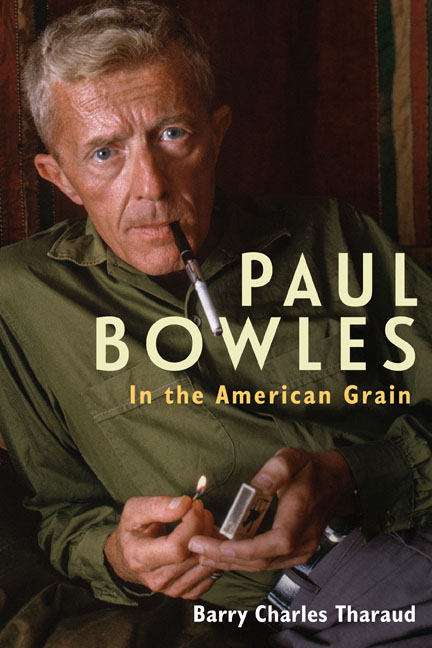Book contents
- Frontmatter
- Contents
- Preface
- Acknowledgments
- Abbreviations
- Introduction: Paul Bowles as a Canonical Writer
- 1 Paul Bowles on Intercultural Understanding: Too Far from Home
- 2 The Discovery of Existence: Without Stopping
- 3 Emersonian Shadows
- 4 Culture and Existence in Bowles’ Short Fiction
- 5 Gide and Bowles in North Africa: The Sheltering Sky
- 6 Language, Noise, Silence: Self and Society in Let It Come Down
- 7 The Spider’s House: The Social Construction of Reality
- 8 Existence and Imagination: Up Above the World
- 9 The Letters: In Touch
- Conclusion
- Bibliography
- Index
3 - Emersonian Shadows
Published online by Cambridge University Press: 24 November 2020
- Frontmatter
- Contents
- Preface
- Acknowledgments
- Abbreviations
- Introduction: Paul Bowles as a Canonical Writer
- 1 Paul Bowles on Intercultural Understanding: Too Far from Home
- 2 The Discovery of Existence: Without Stopping
- 3 Emersonian Shadows
- 4 Culture and Existence in Bowles’ Short Fiction
- 5 Gide and Bowles in North Africa: The Sheltering Sky
- 6 Language, Noise, Silence: Self and Society in Let It Come Down
- 7 The Spider’s House: The Social Construction of Reality
- 8 Existence and Imagination: Up Above the World
- 9 The Letters: In Touch
- Conclusion
- Bibliography
- Index
Summary
WE ALL KNOW ABOUT the uses and misuses of philosophy, whereby idealistic thinkers are inappropriately contextualized to support behavior they would never condone. For example, years ago, Fritz Perls, Gestalt psychiatrist at the Esalen Institute in Big Sur, coined a catchy slogan, part of which reads:
I am not in this world to live up to your expectations,
And you are not in this world to live up to mine.
You are you, and I am I,
And if by chance we find each other, it's beautiful.
During my college years, some wag printed this slogan under a photo of Hitler, suggesting that the “Gestalt prayer” was an excuse for abdication of personal responsibility. And I recall a movie a decade or so later in which a couple, after the husband loses his lucrative job during the 1970s aerospace industry slump in Los Angeles, go on a crime spree. But before they begin their antics, they first appeal to the wife's wealthy parents— who refuse to help, but they cover their selfish materialism by gushing about how the couple will have a chance to learn “self-reliance,” as they point to a large portrait of Emerson that hangs over the fireplace mantle.
On a more sober note, today it might be tempting to see a consanguinity between Bowles and Emerson as another inappropriate contextualization— a sort of subterranean projection of Emersonian individualism and spontaneity. After all, it is one thing when Emerson tells us in “Self- Reliance” that “if I am the devil's child, I will then live from the Devil” or that “Nothing is at last sacred but the integrity of your own mind” (RWE, Essays, First Series, “Self-Reliance,” 262, 261), and something altogether different when Nelson Dyar, Bowles’ protagonist in his novel Let It Come Down, kills his Moroccan acquaintance Thami in a drug-induced state by driving a nail through his ear and into his skull (PB2, 521). Hence, at first glance Bowles may appear to embody another example of a philosophy gone wrong or a perversion of thought that was initially intended for other purposes. However, we have seen in the previous chapter that Bowles represents himself in his autobiography as having an instinctive awareness of existence from his earliest primal memories, as well as an important contact with Emerson's essays during a formative period of his early youth.
- Type
- Chapter
- Information
- Paul BowlesIn the American Grain, pp. 57 - 68Publisher: Boydell & BrewerPrint publication year: 2020



